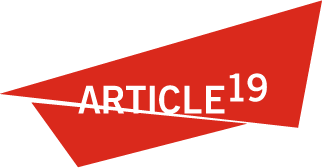
ARTICLE 19 is concerned by the decision of the Nigerian authorities to indefinitely suspend the social networking service Twitter in the country after the company deleted two threatening posts by President Buhari. This arbitrary decision constitutes a serious violation of Nigerian rights to freedom of expression and access to information. The authorities must immediately reconsider this decision and comply with international standards.
Alfred Bulakali, Deputy Regional Director of ARTICLE 19 West Africa, raised his concerns in these following words:
“The Nigerian government decision to suspend Twitter in the country is appalling and unjustified. This decision constitutes a violation of fundamental rights of freedom of expression and access to information, guaranteed by the Nigerian constitution and several African and international standards… Such measures impact and violate other rights, including economic rights of millions of Twitter users in the country. Nigerian authorities should reverse this decision and comply with international standards.”
On Wednesday 2 June, Twitter removed two tweets from President Muhammadu Buhari’s Twitter thread in which he was threatening the Biafran independence movement, evoking the 1967-1970 conflict that claimed one million lives. Two days later, on Friday, 4 June, the Nigerian government, via a statement by the Minister of Information and Culture, suspended Twitter in the country and called on the National Broadcasting Commission (NBC) to initiate the process of licensing all social media and video streaming (commonly referred to as Over-The-Top, or OTT) o威而鋼
perations in the country. Twitter’s ban was followed by a directive from the Attorney General of the Federation and Minister of Justice Abubakar Malami to the Director of Public Prosecution of the Federation (DPPF) to prosecute those still using Twitter after the indefinite ban.
The prohibition was enforced on Saturday, with millions of users denied access to the service. However, many Nigerians are trying to circumvent the ban by using virtual private networks (VPNs). On 6 June, NBC directed all radio and television stations to stop using Twitter immediately.
ARTICLE 19 condemns this arbitrary decision as a violation of the right to freedom of expression and access to information recognised by the 1999 constitution of Nigeria. The 37th principle of the Declaration of Principles on Freedom of Expression and Access to Information in Africa 2019 clearly stipulates that: “States shall facilitate the rights to freedom of expression and access to information online and the means necessary to exercise these rights.”
Licensing for OTT and social media should comply with international standards. A Declaration signed by the United Nations Special Rapporteur on Freedom of Opinion and Expression, the Organization for Security and Co-operation in Europe (OSCE) Representative on Freedom of the Media, the Organization of American States (OAS) Special Rapporteur on Freedom of Expression and the African Commission on Human and Peoples’ Rights (ACHPR) Special Rapporteur on Freedom of Expression and Access to Information on 1 June 2011 provides that measures such as imposing registration and other requirements on service providers are not legitimate, unless such measures meet a three-part test, including that they are provided for by law, pursue a legitimate aim and are necessary in a democratic society.
Twitter allows citizens and all actors to have access to instantaneous information and to exercise their right to participate actively in public affairs and share their views on how the country is governed. As of now, the measures announced by the government seem to be more of a retaliation than a response to a public interest imperative and do not meet the test of proportionality required by freedom of expression standards.
ARTICLE 19 calls on the Nigerian authorities to rethink this suspension and stop threatening Nigerian citizens who continue to use Twitter. ARTICLE 19 also warns against any attempt to impose licenses to Over the Top (OTT) and social media to undermine fundamental freedoms and remind the authorities of the necessity to explain the need for such regulation. Authorities must ensure that any such restrictions on freedom of expression are proportional and necessary in a democratic society.
For more information, contact Alfred Nkuru Bulakali, Deputy Regional Director, ARTICLE 19 Senegal/West Africa senegal@article19.org
or Eliane NYOBE, Senior Program Assistant, ARTICLE 19 Senegal/West Africa: eliane@article19.org
Tel: +221 77 553 13 87 or +221 33 869 03 22
